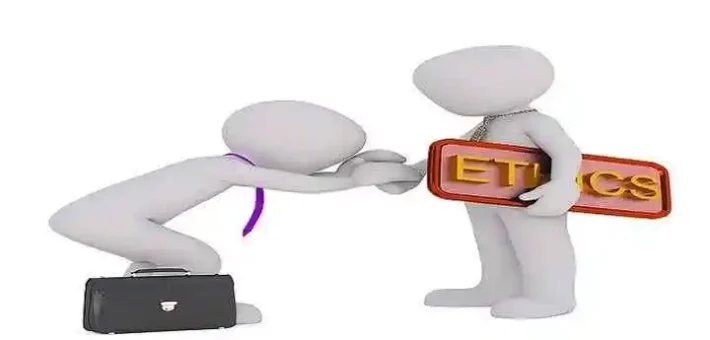Ethics and Trust in the Investment Profession MCQS – CFA LEVEL 1
Ethics encompasses a set of moral principles and rules of conduct that provide guidance for our behavior. Here in MCQs.club we have prepared easy and useful Multiple-Choice Questions (MCQs) on Reading 1 Ethics and Trust in the Investment Profession CFA level I that fully covers MCQs on cfa level 1 ethics, cfa ethical and professional standards mcqs, cfa standards of professional conduct quizzes, role of ethics in investments and standards of professional conduct cfa mcqs. These cfa ethics practice questions and quest bank are also relevant and useful for competitive exams, other professional exams and Business management exams.
Ethics
- Ethics encompasses a set of moral principles and rules of conduct that provide guidance for our behavior.
- True
- False
- Ethics is used to describe the guiding beliefs or ideals characterizing a society or societal group.
- True
- False
- Which of the following is correct for the “Beliefs”?
- Beliefs are assumptions or thoughts we hold to be true.
- Our beliefs form our values— those things we deem to have worth or merit.
- Both A&B
- None
- Moral principles or ethical principles are:
- beliefs regarding what is good, acceptable, or obligatory behavior
- what is bad, unacceptable, or forbidden behavior
- Both A&B
- None
- Ethical principles may refer to beliefs regarding behavior that an individual expects of himself or herself, as well as shared beliefs regarding standards of behavior expected or required by a community or societal group.
- The above statement is correct
- The above statemen is incorrect
- Ethical conduct –
- is behavior that follows moral principles and balances self- interest with both the direct and the indirect consequences of the behavior on others.
- are those actions that are perceived as beneficial and conforming to the ethical expectations of society.
- Both A&B
- None
- Ethical actions –
- is behavior that follows moral principles and balances self- interest with both the direct and the indirect consequences of the behavior on others.
- are those actions that are perceived as beneficial and conforming to the ethical expectations of society.
- Both A&B
- None
- Ethical principles include:
- Honesty, transparency
- Fairness or justice
- Diligence and respect for the rights of others
- All of the above
- Specific communities or societal groups in which we live and work sometimes codify their beliefs about obligatory and forbidden conduct in a written set of principles, often called a “code of ethics”.
- The above statement is correct
- The above statement is incorrect
- The code of ethics serves as a general guide for how community members should act.
- True
- False
- Violations of a community’s established code of ethics and/or standards of conduct can harm the community in a variety of ways. The examples include:
- Violations have the potential to damage the community’s reputation among external stakeholders and the general public.
- Violations can also damage the community’s reputation internally and lead to reduced trust among community members
- Violations can cause the organization to fracture or splinter from within
- All of the above
Ethics and Professionalism
- A profession is an occupational community that has specific education, expert knowledge, and a framework of practice and behavior. Most professions emphasize an ethical approach, the importance of good service, and empathy with the client.
- The above is correct
- The above is incorrect
- For a profession to be credible, a primary goal is to establish ___________among clients and among society in general.
- Ethical values
- Trust
- Core structure
- None
- A profession that earns trust may ultimately have greater flexibility and independence from government regulators to manage its own affairs.
- True
- False
- The common characteristics of professions include:
- normalize practitioner behavior
- provide a service to society
- are client focused
- All of the above
- An integral part of a profession’s mission is to develop and administer:
- Codes
- Best practice guidelines
- Standards that guide an industry
- All of the above
- Professions develop curricula that equip future professionals with competence, including technical skills, knowledge, and ethics.
- True
- False
- Professionals should be respectful to each other, even when they are competing. They must respect the rights, dignity, and autonomy of others.
- The above is correct
- The above is incorrect
Professionalism in Investment Management
- Which of the following is incorrect for the “Investment management”?
- It is a relatively young profession, which means that public understanding of its practice and codes is still developing.
- Not everyone engaged in investment management is a professional
- The investment management profession meets most, but currently not all, of the expectations of a profession.
- All of the above
- Investment professionals are also expected to have superior financial expertise, technical knowledge, and knowledge of the applicable laws and regulations.
- True
- False
- The investment management profession affects key aspects of the economy, including:
- savings, retirement planning
- the pricing and allocation of capital
- Both A&B
- None
- The reasons why practitioners, clients, regulators, and governments have supported the development of an investment management profession include:
- Higher levels of trust
- Better capital allocation
- Both A&B
- None
- CFA Institute is the largest body for investment management professionals.
- True
- False
- The mission of CFA Institute is to lead the investment profession globally, by promoting the highest standards of ethics, education, and professional excellence for the ultimate benefit of society.
- The above statement is correct
- The above statement is incorrect
Challenges to Ethical Conduct
- Situational influences are external factors, such as:
- environmental or cultural elements, that shape our thinking
- decision making, and behavior
- Both A&B
- None
- Common situational influences in the investment industry that can shape thinking and behavior include:
- Money
- Prestige
- Both A&B
- None
- Bonuses, promotions, prestige, and loyalty to employer and colleagues are examples of situational influences that frequently have a disproportionate weight in our decision making.
- True
- False
- When our decision making is too narrowly focused on short-term factors and/or self-interest, we tend to ignore and/or minimize the longer- term risks and/or costs and consequences to ourselves and others, and the likelihood of suffering ethical lapses and making poor decisions increases.
- The above statement is correct
- The above statement is incorrect
- Loyalty to employer and/or colleagues is an extremely powerful situational influence.
- True
- False
Ethical vs. Legal Standards
- Laws and regulations often codify ethical actions that lead to better outcomes for society or specific groups of stakeholders.
- True
- False
- Whistleblowing – refers to the disclosure by an individual of dishonest, corrupt, or illegal activity by an organization or government. This is the area in which ethics and laws may conflict.
- True
- False
- Which of the following statements is most accurate?
- All legal behavior is ethical behavior.
- Some ethical behavior may be illegal.
- Legal standards represent the highest standard.
- None
Ethical Decision- Making Frameworks
- Laws, regulations, professional standards, and codes of ethics can guide ethical behavior, but _____________is a critical ingredient in making principled choices and engaging in appropriate conduct.
- Individual judgment
- Collective decision
- Both A&B
- None
- An investment professional’s natural desire to “do the right thing” can be reinforced by building a culture of ________________in the workplace.
- Trust and confidence
- Integrity and accountability
- Both A&B
- None
- Ethical decision- making frameworks –
- Are designed to facilitate the decision-making process for all decisions.
- They help people look at and evaluate a decision from multiple perspectives, enabling them to identify important issues they might not otherwise consider.
- It will help you develop sound judgment and decision- making skills and avoid making decisions that have unanticipated ethical consequences.
- All of the above
- The ethical decision- making process includes multiple phases including:
- you will want to identify the important facts that you have available to you
- you will take time to consider the situational influences
- make a decision and act
- All of the above
—more to come soon—
Read more
Read more
Read more
Read more
Read more




